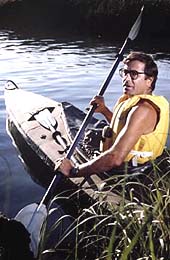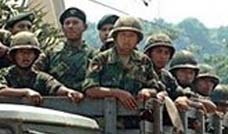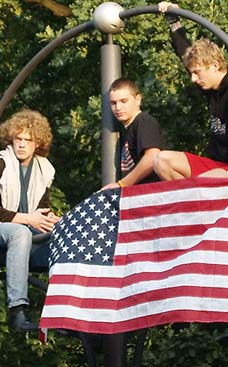
“I got the idea when I went to Africa. I wrote Dark Star Safari. I went back to a school I had taught in from '63 to '65 in Malawi,” Theroux explains. “I went the long way. I started in Cairo and went all the way down to Cape Town. I saw places I had known well and places I hadn't known at all. The places I had known well were the places I really took a lot of pleasure in writing about.” Revisiting these once-familiar places taught a poignant lesson to Theroux, who worked in the Peace Corps in Malawi in an age when President Kennedy had called on Americans to “ask what you can do for your country”. “People where saying, ‘In the next two or three years something is going to happen'.” he says. “I would say, ‘No, it's not going to happen because I was here 40 years ago and people were saying that then'. “Forty years ago people were saying: ‘The five-year plan.' ‘We are going to put a bridge up.' ‘Reforestation.' It ain't going to happen. “You are going to have more disease, more illiteracy and more misery. You're kidding yourselves.” Theroux is sensitive to the accusation that he has just become a grumpy old man disappointed in his youthful ideals. “The real fault with ‘time travel' is that you can sound so fogeyish when you talk about Memory Lane or about how things were,” he concedes. “I'd like to avoid that if possible.” Author Paul Theroux served as a Peace Corps Volunteer in Malawi in the 1960's.
Paul Theroux revisits once-familiar places including Malawi where Theroux served as a Peace corps Volunteer
Interview with Paul Theroux, author of Ghost Train to the Easter Star: On the Tracks of The Great Railway Bazaar
Paul Theroux en route from Moscow to Paris retracing the journey that inspired his breakthrough travel book.
James Bone
IT IS SAID THAT a French writer in search of material for a novel has an affair. An English writer goes on a journey.
In 1973, Paul Theroux, an American novelist living in London with a British wife, chose the very English course of setting off on a train ride across Asia. The trip yielded his breakthrough book The Great Railway Bazaar, which became a model for a generation of travel literature.
Now Theroux has retraced his tracks in Ghost Train to the Eastern Star, rattling by rail for 28,000 miles from London to Japan and back. In it, he reveals that while he was riding the railways for the first book, his wife had an affair.
The admission, after half a lifetime, casts his famous book in a new light. “I concealed everything about my domestic turmoil,” he writes. “I made the book jolly, and like many jolly books it was written in an agony of suffering, with the regret that in taking the trip I had lost what I valued most: my children, my wife, my happy household.”
Now 67, Theroux remains an inveterate traveller and railway enthusiast who delights in “rubbing across the world”. On his latest adventure, he travels across a bridge outside the Georgian town of Gori that was later blown up by the Russians; attends a performance by an orchestra of land-mine amputees in the jungle of Cambodia; and is offered a souvenir walrus penis in Tashkent. In Tokyo, he visits a six-storey sex shop that sells fetish uniforms; he inspects “very hairy” pornograpy in Budapest; and is offered $40 “boom-boom” by a hooker in Hanoi.
But this time his book is not so much about the travelling as it is about the author himself. Writing about travel has become a substitute for the autobiography he once envisioned - the first volume entitled Who I Was and the second I Told You So - but will now never write.
In person, Theroux is an amiable and chatty man, practiced at buttonholing fellow wayfarers on his world travels. When we meet for curry (with gazpacho soup) at the Taj Boston hotel, he reveals unselfconsciously that he was forced to break his latest journey in Japan to return to Hawaii for a colonoscopy. “Have you had a colonoscopy?” he asks gaily. Since his health is fine, I decide to probe other avenues of inquiry.
Theroux is now just over twice the age he was when he set off for The Great Railway Bazaar and, publishing his 42nd book, has matured as a writer.
“I found it hard to write about myself when I was in my thirties. I didn't write anything in the first person that was about myself. I never wrote about my family. I thought that writing comes from inside me but it's about something outside. So when I wrote The Railway Bazaar it was unthinkable for me to put my marriage or anything that personal in the book,” he says.
“When you get to a certain age, you realise it's all part of life's rich tapestry. It's part of the story. That's quite a big difference ...” he reflects. “I now have the perspective to be able to write about myself. You have to live longer. Perhaps that's the lesson of the book, or the lesson of life: You really have to live a little before you can understand the world.”
Travel writing is quintessentially about place. It is a three-dimensional genre. Indeed, railway-travel writing - if there is such a sub-genus - can seem almost two dimensional as the passenger watches the passing tableaux with his nose pressed against the window.
What Theroux does in his latest book by revisiting his previous destinations after 33 years is to add the fourth dimension: Time.
In its modest way, Ghost Train to the Eastern Star assays what Lawrence Durrell achieved in his classic The Alexandria Quartet - a tetralogy that Theroux adores. Inspired by Einstein's theory of relativity, Durrell's four books approach the same events from different standpoints, with the final volume looking back from the vantage point of time. Ghost Train attempts the same feat.
“I got the idea when I went to Africa. I wrote Dark Star Safari. I went back to a school I had taught in from '63 to '65 in Malawi,” Theroux explains. “I went the long way. I started in Cairo and went all the way down to Cape Town. I saw places I had known well and places I hadn't known at all. The places I had known well were the places I really took a lot of pleasure in writing about.”
Revisiting these once-familiar places taught a poignant lesson to Theroux, who worked in the Peace Corps in Malawi in an age when President Kennedy had called on Americans to “ask what you can do for your country”.
“People where saying, ‘In the next two or three years something is going to happen'.” he says. “I would say, ‘No, it's not going to happen because I was here 40 years ago and people were saying that then'.
“Forty years ago people were saying: ‘The five-year plan.' ‘We are going to put a bridge up.' ‘Reforestation.' It ain't going to happen.
“You are going to have more disease, more illiteracy and more misery. You're kidding yourselves.”
Theroux is sensitive to the accusation that he has just become a grumpy old man disappointed in his youthful ideals. “The real fault with ‘time travel' is that you can sound so fogeyish when you talk about Memory Lane or about how things were,” he concedes. “I'd like to avoid that if possible.”
Yet the book bears witness to the eternal melancholy of the world. On his first trans-Asia trip, he had to skip Cambodia because of the massacres of Pol Pot and avoid China because of the impact of the Cultural Revolution. He could visit Vietnam only with difficulty because of the war. This time around, he has to hopscotch over Iran because of the Islamic revolution and avoid Afghanistan and Pakistan altogether for his own safety.
“Older people,” he writes, “are perceived as cynics and misanthropes - but no, they are simply people who have at last heard the still, sad music of humanity played by an inferior rock band howling for fame.”
It is not that everything is going to pot. Theroux is impressed that Turkey, which had once “seemed a distant and exotic country of frowning men and enigmatic women, with unreliable telephones and simple roads”, is now “part of the visitable world”. He remains dazzled by Japan, which “even long ago ... seemed to me the future”. He is positively enchanted by the Vietnamese capacity for forgiveness. “We dropped 7 milion tonnes of bombs, 20 million tonnes of defoliant. We didn't leave anything behind. And an American goes there and they are saying: ‘Welcome, you want a massage?'” he says.
He fraternises with fellow writers: Orhan Pamuk in Istanbul, Arthur C. Clarke in Colombo and Haruki Murakami in Tokyo.
Elsewhere on his route, however, he encounters the “dystopia” of Turkmenistan, where a dictator erects gold statues of himself in a poverty-stricken land; the “open prison” of Burma; the “stubborn seediness” of the train to the new EU entrant Romania; and a China where the only thing anyone cares about is money. He doubts the supposed “Indian Miracle”, writing: “It seemed to me that little had changed except the size of the population, an unfeedable, unhous-able, uncontainable 1.3 billion people, not many of them saying ‘We are modern now' ...”
Theroux is now married to a PR executive in Hawaii, where he raises honey bees. He congratulates himself on his accomplished sons: Louis, 38, the TV presenter; and Marcel, 40, a novelist. “They are doing things I admire. That I would do myself,” he says.
But his latest trip reawakened memories of his first wife's infidelity. He remained married to Anne Castle, a BBC executive, for almost another 15 years. Although he admits he had also been unfaithful, he says her affair was “a blow”. At one point, he threatened to kill the object of her attentions - a subject he fictionalised in the novel My Secret History.
In Ghost Train, Theroux confides to Murakami that on his first journey he called his wife on a bad line from Tokyo and realised from her frosty response that she was with another man.
“How did you write your book?” the Japanese novelist asks.
“That's the thing, see? It was the cure. Writing the book fixed my head,” Theroux replies.












